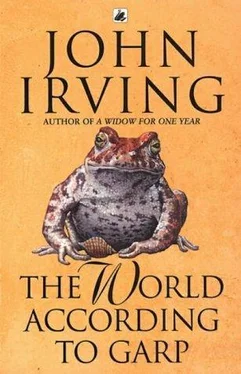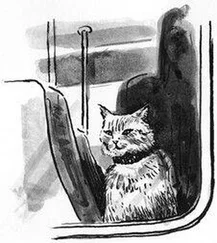“Fuck the story,” she said. “No, I don't like it. And I don't want to talk about it, either. You don't care to regard what I want, obviously. You're like a little boy at the dinner table—you serve yourself first.”
“You don't like it?” Garp said.
“Oh, it's not bad ,” she said, “it's just not much of anything. It's a trifle, it's a little ditty. If you're warming up to something, I'd like to see what it is—when you get to it. But this is nothing, you must know that. It's a toss-off, isn't it? You can do tricks like this with your left hand, can't you?”
“It's funny , isn't it?” Garp asked.
“Oh, it's funny ,” she said, “but it's funny like jokes are funny. It's all one-liners. I mean, what is it? A self-parody? You're not old enough, and you haven't written enough, to start mocking yourself. It's self-serving, it's self-justifying; and it's not about anything except yourself, really. It's cute.”
“Son of a bitch,” said Garp. “ Cute?"
“You're always talking about people who write well but don't have anything to say,” Helen said. “Well, what do you call this? It's no “Grillparzer,” certainly; it isn't worth a fifth of what “Grillparzer” is worth. It isn't worth a tenth of that story,” Helen said.
“"The Pension Grillparzer” is the first big thing I wrote,” Garp said. “This is completely different; it's another kind of fiction altogether.”
“Yes, one is about something and one is about nothing,” Helen said. “One is about people and one is about only you . One has mystery and precision, and one has only wit.” When Helen's critical faculties were engaged, they were difficult to disengage.
“It's not fair to compare them,” Garp said. “I know this is smaller .”
“Then let's not talk anymore about it,” Helen said.
Garp sulked for a minute.
“You didn't like the Second Wind of the Cuckold , either,” he said, “and I don't suppose you'll like the next one any better.”
“ What next one?” Helen asked him. “Are you writing another novel?”
He sulked some more. She hated him, making her do this to him, but she wanted him and she knew she loved him, too.
“Please,” she said. “Let's go to bed.”
But now he saw his chance for a little cruelty—and/or a little truth—and his eyes shone at her brightly.
“Let's not say another word,” she begged him. “Let's go to bed.”
“You think “The Pension Grillparzer” is the best thing I've written, don't you?” he asked her. He knew already what she thought of the second novel, and he knew that, despite Helen's fondness for Procrastination , a first novel is a first novel. Yes, she did think “Grillparzer” was his best.
“So far, yes,” she said, softly. “You're a lovely writer, you know I think so.”
“I guess I just haven't lived up to my potential,” Garp said, nastily.
“You will,” she said; the sympathy and her love for him were draining from her voice.
They stared at each other; Helen looked away. He started upstairs. “Are you coming to bed?” he asked. His back was to her; his intentions were hidden from her—his feelings for her, too: either hidden from her or buried in his infernal work .
“Not right now,” she said.
He waited on the stairs. “Got something to read ?” he asked.
“No, I'm through reading for a while,” she said.
Garp, went upstairs. When she came up to him, he was already asleep, which made her despair. If he'd had her on his mind at all, how could he have fallen asleep? But, actually, he'd had so much on his mind, he'd been confused; he had fallen asleep because he was bewildered. If he'd been able to focus his feelings on any one thing, he'd still have been awake when she came upstairs. They might have saved a lot of things, then.
As it was, she sat beside him on the bed and watched his face with more fondness than she thought she could stand. She saw he had a hard-on, as severe as if he had been waiting up for her, and she took him into her mouth and sucked him softly until he came.
He woke up, surprised, and he was very guilty-looking—when he appeared to realize where he was, and with whom. Helen, however, was not in the least guilty-looking; she looked only sad. Garp would think, later, that it was as if Helen had known he had been dreaming of Mrs. Ralph.
When he came back from the bathroom, she was asleep. She had quickly drifted off. Guiltless at last, Helen felt freed to have her dreams. Garp lay awake beside her, watching the astonishing innocence upon her face—until the children woke her.
WHEN Walt caught colds, Garp slept badly. It was as if he were trying to breathe for the boy, and for himself. Garp would get up in the night to kiss and nuzzle the child; anyone seeing Garp would have thought that he could make Walt's cold go away by catching it himself.
“Oh, God,” Helen said. “It's just a cold. Duncan had colds all winter when he was five.” Nearing eleven, Duncan seemed to have outgrown colds; but Walt, at five, was fully in the throes of cold after cold—or it was one long cold that went away and came back. By the March mud season, Walt's resistance struck Garp as altogether gone; the child hacked himself and Garp awake each night with a wet, wrenching cough. Garp sometimes fell asleep listening to Walt's chest, and he would wake up, frightened, when he could no longer hear the thump of the boy's heart; but the child had merely pushed his father's heavy head off his chest so that he could roll over and sleep more comfortably.
Both the doctor and Helen told Garp, “It's just a cough.”
But the imperfection in Walt's nightly breathing scared Garp right out of his sleep. He was usually awake, therefore, when Roberta called; the late-night anguish of the large and powerful Ms. Muldoon was no longer frightening to Garp—he had come to expect it—but Garp's own fretful sleeplessness made Helen short-tempered.
“If you were back at work, on a book, you'd be too tired to lie awake half the night,” she said. It was his imagination that was keeping him up, Helen told him; one sign that he hadn't been writing enough, Garp knew, was when he had too much imagination left over for other things. For example, the onslaught of dreams: Garp now dreamed only of horrors happening to his children.
In a dream, there was one horror that took place while Garp was reading a pornographic magazine. He was just looking at the same picture, over and over again; the picture was very pornographic. The wrestlers on the university team, with whom Garp occasionally worked out, had a peculiar vocabulary for such pictures. This vocabulary, Garp noted, had not changed since his days at Steering, when the wrestlers on Garp's team spoke of such pictures in the same fashion. What had changed was the increased availability of the pictures, but the names were the same.
The picture Garp looked at in the dream was considered among the highest in the rankings of pornographic pictures. Among pictures of naked women, there were names for how much you could see. If you could see the pubic hair, but not the sex parts, that was called a bush shot—or just a bush. If you could see the sex parts, which were sometimes partially hidden by the hair, that was a beaver; a beaver was better than just a bush; a beaver was the whole thing: the hair and the parts. If the parts were open , that was called a split beaver. And if the whole thing glistened , that was the best of all, in the world of pornography: that was a wet, split beaver. The wetness implied that the woman was not only naked and exposed and open, but she was also ready .
Читать дальше












